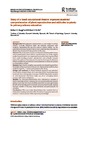Story of a Seed: educational theatre improves students’ comprehension of plant reproduction and attitudes to plants in primary science education
| dc.contributor.author | Stagg, BC | |
| dc.contributor.author | Verde, Michael | |
| dc.date.accessioned | 2018-10-14T09:27:14Z | |
| dc.date.available | 2018-10-14T09:27:14Z | |
| dc.date.issued | 2019-01-02 | |
| dc.identifier.issn | 0263-5143 | |
| dc.identifier.issn | 1470-1138 | |
| dc.identifier.uri | http://hdl.handle.net/10026.1/12509 | |
| dc.description.abstract |
Background Although plant reproduction is a core subject in school science curricula, botanical topics are typically unpopular with students. Integrating the arts into science subject matter has the potential to increase student interest and understanding. Educational theatre has shown particular promise in this area. Purpose The study examined how an interactive theatre performance, where professional actors deliver a performance but invite regular audience participation as a way to promote active learning, benefited both understanding of plant reproduction and attitudes towards plants. Perceptions of the play and the way in which specific elements influenced learning and emotions were examined in detail and placed in a theoretical context. Sample Opportunity sampling was used to recruit participants from five public primary schools in Devon, UK. One hundred and forty-four students (aged 9–11 years) participated in the study. Design and methods A mixed methods approach was adopted. Quantitative analysis of pre- and post-intervention knowledge tests involved t-tests and repeated measures ANCOVA. Qualitative analysis of semi-structured interviews made use of an emerging theme analysis with a priori categories. Results Pre- and post-intervention tests indicated an increase in both knowledge of plant reproduction and positive attitudes towards plants. Follow-up interviews identified elements that were particularly beneficial for learning and enjoyment, including the thematic singing, humour, novelty of the play, visual elements and participatory art activities. Conclusions This case study demonstrates the potential that an interactive theatre production offers for enhancing appreciation and interest in school science while improving knowledge. | |
| dc.format.extent | 15-35 | |
| dc.language | en | |
| dc.language.iso | en | |
| dc.publisher | Informa UK Limited | |
| dc.subject | Theatre | |
| dc.subject | art | |
| dc.subject | primary science | |
| dc.subject | plant sciences | |
| dc.subject | drama | |
| dc.title | Story of a Seed: educational theatre improves students’ comprehension of plant reproduction and attitudes to plants in primary science education | |
| dc.type | journal-article | |
| dc.type | Journal Article | |
| plymouth.author-url | https://www.webofscience.com/api/gateway?GWVersion=2&SrcApp=PARTNER_APP&SrcAuth=LinksAMR&KeyUT=WOS:000457248600002&DestLinkType=FullRecord&DestApp=ALL_WOS&UsrCustomerID=11bb513d99f797142bcfeffcc58ea008 | |
| plymouth.issue | 1 | |
| plymouth.volume | 37 | |
| plymouth.publication-status | Published | |
| plymouth.journal | Research in Science & Technological Education | |
| dc.identifier.doi | 10.1080/02635143.2018.1455655 | |
| plymouth.organisational-group | /Plymouth | |
| plymouth.organisational-group | /Plymouth/Faculty of Health | |
| plymouth.organisational-group | /Plymouth/Faculty of Health/School of Psychology | |
| plymouth.organisational-group | /Plymouth/REF 2021 Researchers by UoA | |
| plymouth.organisational-group | /Plymouth/REF 2021 Researchers by UoA/UoA04 Psychology, Psychiatry and Neuroscience | |
| plymouth.organisational-group | /Plymouth/Research Groups | |
| plymouth.organisational-group | /Plymouth/Research Groups/Centre for Brain, Cognition and Behaviour (CBCB) | |
| plymouth.organisational-group | /Plymouth/Research Groups/Centre for Brain, Cognition and Behaviour (CBCB)/Cognition | |
| plymouth.organisational-group | /Plymouth/Users by role | |
| plymouth.organisational-group | /Plymouth/Users by role/Academics | |
| dcterms.dateAccepted | 2018-01-01 | |
| dc.rights.embargodate | 2022-1-25 | |
| dc.identifier.eissn | 1470-1138 | |
| dc.rights.embargoperiod | Not known | |
| rioxxterms.versionofrecord | 10.1080/02635143.2018.1455655 | |
| rioxxterms.licenseref.uri | http://www.rioxx.net/licenses/all-rights-reserved | |
| rioxxterms.licenseref.startdate | 2019-01-02 | |
| rioxxterms.type | Journal Article/Review |


